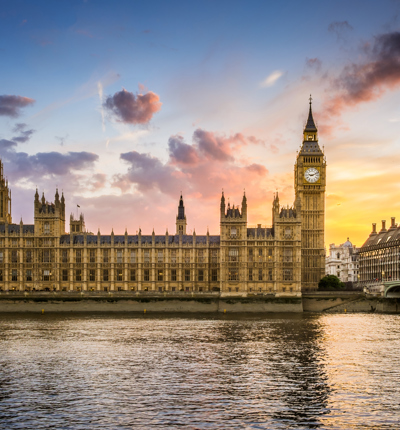
Legal challenge to Government's failure to investigate Russian threat to UK democratic processes
A cross-party group of Parliamentarians and democracy campaign group, the Citizens has issued court proceedings.
Posted on 29 October 2020
A cross-party group of Parliamentarians and democracy campaign group, the Citizens has issued court proceedings challenging both the UK Government’s failure to institute an independent investigation into Russian interference in UK democratic processes, and to put in place an adequate legislative framework to protect future elections from foreign interference.
The group has applied for judicial review of the Government’s inaction and failure to address the gap in the law, claiming it breaches its obligations under Article 3 of Protocol 1 (A3P1) of the European Convention on Human Rights (ECHR) which protects each citizen’s right to free and fair elections and the Inquiries Act 2005.
A3P1 requires that free elections are held “under conditions which will ensure the free expression of the opinion of the people in their choice of legislature”, which the Claimants say have been damaged by Russian interference. The Inquiries Act facilitates an inquiry when it appears to a Minister that particular events have caused public concern, which the Claimants say has happened here.
The Citizens is joined in its claim by Lord Strasburger, Ben Bradshaw MP, Chris Bryant MP, Caroline Lucas MP, Alyn Smith MP and Baroness Wheatcroft. Together, they are represented by Leigh Day solicitors. Lord Ricketts the former National Security Advisor to David Cameron has given a statement in support of the claim.
The claim follows the publication of the Russia Report, by the Intelligence and Security Committee (ISC), in July 2020, nine months after it had been sent to the Prime Minister’s Office for a final security check. The Report states:
- There is credible evidence of attempts to interfere with the United Kingdom’s electoral processes from at least the time of the EU referendum in 2016
- There is an urgent need for new legislation to protect the UK’s democratic processes from foreign interference, the Official Secrets Act is no longer fit for purpose, and there is no one body with primary responsibility to defend the UK democratic processes from hostile foreign interference.
- There has been a failure by the UK Government to investigate the threat of Russian interference in the UK democratic processes and calls for such an investigation.
Evidence of attempts by Russia to interfere in the UK democratic processes include:
- Cyber-attacks, disinformation and influence campaigns
- The preponderance of pro-Brexit or anti-EU stories on RT and Sputnik, and the use of ‘bots’ and ‘trolls'
- “The online amplification of illicitly acquired and leaked Government documents” in the 2019 General Election (cited by Dominic Raab to Parliament).
- Anti-EU articles published by RT and Sputnik shared widely across social media during the EU Referendum (cited by DCMS Report in 2019)
- “Advertising and fake accounts … used on social media to target people with disinformation during election periods” (cited by DCMS Committee Chair Damian Collins MP)
Members of the ISC and the Digital, Culture, Media and Sport (DCMS) Committee have voiced serious concerns that, despite the Russia Report, the Government has rejected calls for an independent investigation into Russian interference in the UK democratic processes.
The Claimants stress that The European Court of Human Rights (“ECtHR”) has consistently emphasised that the rights guaranteed under A3P1 are critical to establishing and maintaining the foundations of an effective and meaningful democracy governed by the rule of law. It requires states to investigate credible threats to the positive duty to hold free and fair elections.
They say the existence of credible evidence of Russian interference in UK democratic processes – including the 2016 EU referendum, the 2014 Scottish referendum and the 2019 UK General Election – has caused serious public concern and satisfies the first test for establishing an inquiry under the Inquiries Act.
The Grounds of the claim are:
The UK Government’s decision not to, and/or the ongoing failure to, order an independent investigation into Russian interference in UK democratic electoral processes, following the publication of the Russia Report, is incompatible with A3P1
The UK’s current legal framework with respect to the protection of the electoral process from foreign state interference infringes A3P1
The decision not to establish a public inquiry under the 2015 Act is contrary to the public interest, unreasonable and disproportionate
Caroline Lucas MP said:
“The Prime Minister’s casual dismissal of the Russia Report is deliberately irresponsible. Attempts to undermine western democracies have not stopped and we need to learn from what’s happened in the past so we can ensure our electoral processes are robust enough to withstand potential future meddling. The sovereignty and security of our country, alongside the integrity of our democracy is at stake, and this Government’s wilfully turning a blind eye cannot be allowed to pass unchallenged.
Lord Strasburger said:
“For some reason the Prime Minister seems determined to keep us in the dark about these repeated Russian attacks on our democracy. Moscow's blizzard of cleverly disguised disinformation undermines our freedom as a sovereign State to choose our own leaders and our country's direction. You have to ask why the PM doesn't want us to know the truth.”
Alyn Smith MP said:
“The Russia Report proves the UK government has a case to answer, and it is precisely because of their subsequent stonewalling we are going to law to bring some scrutiny to this as it won’t come from Westminster with an 80-seat compliant sycophant majority. I’m proud to be part of an effort where we have put the party badges to one side to work together on the national (however one defines it) interest.”
Baroness Wheatcroft said:
“Free and fair elections are a cornerstone of any democracy. There is no doubt that the internet has opened the way for widespread potential interference in the electoral process from malign forces and that Russia has tried to exploit that opportunity.
“The Government must do its best to protect our electoral system and it can only begin to do that effectively if it first investigates the nature and scale of the problem. It is shameful that it refuses to do that voluntarily but that refusal is why I am party to this action to try and compel the action that the country deserves.”
A spokesperson for the Citizens said:
“It is completely extraordinary that the UK government should have so little concern for the national security of the country, that a cross-party group of MPs and Peers feels it has no choice but to take legal action in this way.
“As far as we know, it is unprecedented in modern British history. In the US, multiple investigations involving hundreds of intelligence officers and Congressional inquiries have detailed the extensive attacks by Russia on the 2016 US election. In Britain, that process hasn't even begun. We hope this will be the beginning of that process.”
Leigh Day Partner, Tessa Gregory said:
“Our clients, who represent a range of political views, are taking this groundbreaking legal action to safeguard the right of UK citizens to free and fair elections as protected by Article 3 of the First protocol of the European Convention on Human Rights. They are asking the court to step in to ensure that the Government complies with its legal duty to independently investigate credible allegations of Russian interference and to adequately protect future elections from foreign interference.”
The Claimants are represented by Leigh Day solicitors Tessa Gregory and Tom Short and Richard Hermer QC of Matrix Chambers and Ben Jaffey QC, Jason Pobjoy and Natasha Simonsen from Blackstone Chambers.



